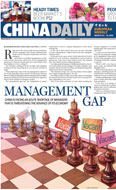Japan's disaster more gloom than doom
Updated: 2011-03-25 10:29
By Wang Yongzhong (China Daily European Weekly)
 |
The earthquake, tsunami and nuclear crisis in northern Japan have done tremendous damage to the Japanese economy. The region is home to many factories in the automobile, nuclear power, semiconductor, and petrochemical industries and accounts for 8 percent of Japan's GDP.
The leakage of radiation from the Fukushima Daiichi nuclear power plant has not only aroused concern in Japan, but has also been compounded by a shortage in electricity. Severely damaged roads have forced many factories to suspend production. The official preliminary estimate of economic loss is 20 trillion yen (174.6 billion euros), roughly 4 percent of Japan's GDP in 2010, higher than the economic loss caused by the 1995 earthquake that ravaged Osaka and Kobe.
But it is still too early to thoroughly evaluate the economic impact from the triple disaster since relief work hasn't ended and work to keep the plant from a meltdown is ongoing. This is just a tentative analysis of the economic effects of the disasters.
The quake-stricken region in Japan, although not the industrial center of the nation, was heavily hit by the catastrophes. The decline in Japan's fiscal solvency complicates its possible V-shaped recovery, which usually occurs after natural disasters and is marked by brief periods of a sharp economic decline followed by a mini-boom as homes, businesses and infrastructure are rebuilt. Fortunately, government debts will not be a hindrance to post-disaster reconstruction because Japan is flush with cash after a recent infusion. But the Japanese economy will likely contract this year because of the electricity shortage and damaged roads. The government will likely provide funds to insurance companies, enterprises and individuals. This will create jobs and push up demand, which will help the economy rebound. If the nuclear leak can be effectively contained, the economy will experience that mini-boom.
One of the main problems in Japan's economy, however, lies in the weak demand compared to the supply capability.
The other massive problem for the economy is the threat of severe nuclear pollution. The level of radiation in central Tokyo was about four times higher than normal levels recently. Many people doubt what the government and domestic media are saying and believe they are underestimating the severity of radiation. France also believes the severity of radiation is much higher than has been reported.
If not effectively contained, the Japanese economy will incur a fatal blow. The diffusion of radioactive material will cause havoc in society, hinder production and relief efforts, and contract the Japanese GDP drastically. In the worse case scenario, water and air will be contaminated, affecting the quality of Japanese products.
Japanese agricultural products (which actually have already been contaminated) and tourism will be the first in line to be affected. Since Japanese products are famous for their high quality, this will pose a big threat for their competitiveness. There is a possibility that the economy could take on a U-shaped recovery with a prolonged period in an economic slump. A recession and stagnation could last for years.
Fortunately, the leak is controllable with limited local consequences.
But uncertainties, as I mentioned before, loom large in Japan's economic outlook.
It doesn't help that the global economic recovery will not hold up in my mind because of the disasters in Japan. Its economy, the world's third largest, accounts for 8.7 percent of the world's collective GDP. And because Japan is more of a manufacturing superpower than a world financial center, the global supply chain will be hampered, thus affecting the world economy.
Japanese enterprises have a great deal of influence in manufacturing, optics, auto parts, semiconductor materials and the design of computer chips. The electricity shortage, in halting production and traffic, has not only hurt the supply of materials, but has also made it hard for products to be delivered to airports and ports.
Japan's low stock supply chain has aggravated the supply shortage of Japanese products. The temporary suspension in exports to assembly companies in the Chinese mainland, Taiwan and South Korea will also cause a shortage in supplies and raise prices for critical parts.
Japanese chips account for 20 percent of the world market, and Apple's iPad is extremely dependent on Japanese NAND flash memory. The airfoil and main landing gear for Boeing 787s are provided by Japanese companies.
There is also the glaring problem of the appreciation of the yen, which will likely be temporary and could in the long run depreciate. The yen has been influenced by the backflow of overseas capital and market speculation, which has caused the currency to appreciate drastically.
But the appreciation will have a negative impact on the reconstruction of homes. Four factors are constraining the currency: a backflow of Japanese overseas capitals, the nation's economic and fiscal fundamentals, domestic returns on assets of the yen, as well as the monetary and currency intervention policies of Japanese banks. The last three factors will depreciate the yen. And in order to provide disaster relief and reconstruct homes, the Japanese government as well as insurance companies and investors will likely redeem overseas assets, especially highly liquid US dollar assets, which will cause the demand for yen and the dollar supply to rise. Propelled by an appreciation in the yen, investors will force it to appreciate.
But if you take it all into account - the quake-ridden economy, the high government debt, the nuclear leak, the downturn in shares, the currency intervention policies of Japanese banks and the recent intervention from G7 countries - an appreciation of the yen won't be supported. The appreciation is temporary and a depreciation will prevail in the long run.
Yet another possible sign of trouble is that the Japanese government's debt will deteriorate but will land short of a sovereign debt crisis. Government debt accounted for 200 percent of Japanese GDP last year. Estimates from the International Monetary Fund recently reported that Japanese public debt will account for 232 percent and 277 percent of GDP in 2012 and 2016. The country has the worst fical outlook among developed countries.
But this, too, is a worst-case scenario. The debt problem is not imminent and it won't devolve into a sovereign debt crisis like it did in Europe. The Japanese government's low debt interest will help control debt stock increase. A rise in government debt will lead to a rise in domestic inflation. But because Japan has long suffered from deflation, this won't be a huge concern.
Another possible scenario is that the earthquake may incur an unsustainable rise in risk for US sovereign debt. Japan holds $1.4 trillion in US security assets, the second largest holder of US assets. To meet reimbursement demands after the earthquake, Japanese insurance companies need to sell assets including US bonds, which will cause prices to drop and profit rates to rise in US bonds. The Japanese government and the nation's companies need to sell dollar assets to buy overseas materials for post-disaster reconstruction, which will increase US borrowing costs and unsustainable risk in US sovereign debt.
The quake will also hurt bulk commodity prices, which are likely to drop temporarily but rise in the long run. As one of the main petroleum and iron ore exporters, Japan influences bulk commodity prices. Presently, the current halt in production for Japanese automobile and steel factories will cause prices to drop for iron ore and copper. The post-disaster reconstruction will increase demands of bulk commodities like steel and building materials.
The nuclear crisis has evoked global concern for nuclear power safety and its impact on nuclear power development will change the world's demands for petroleum, natural gas and coal.
The negative impact of the earthquake on China's economy is limited. Japan is one of China's most important trade partners. China's imports from Japan totaled $176.8 billion (124.8 billion euros), and exports $121.2 billion, which account for 12.7 percent and 7.7 percent of China's total trade revenue. The complementary trade is concentrated in electromechanical equipment, electronics, automobiles, optics and textiles. Japan dominates the value chain, taking control of the key technology and brands, whereas China specializes in assembly. The basic framework of Sino-Japanese trade is that Japanese companies relocate their low-tech production to China, and keep their core manufacturing in Japan. When the accessories have been assembled in China, they resell the products to Japan, Europe and the US. China also provides textile, coal, petroleum, mineral and agricultural products to Japan.
The earthquake has brought challenges to China. The suspension of certain Japanese enterprises will have Chinese assembly companies trapped with a shortage in supply and rises in prices, which will lead to more inflation for China. When Japan's economy shrinks, it will lower import demand from China. Increases in petrochemical prices will aggravate China's imported inflation. The drop in US bond prices and rise in its interest rate will affect China's $1.6 trillion holdings of US bond assets.
The negative effects of the earthquake on the global economic recovery cannot be avoided, but Japan's disaster-relief capabilities and the elasticity of the Japanese economy will help its economy rebound quickly. This will promote world trade and economic recovery.
The author is a researcher at the Chinese Academy of Social Sciences.
E-paper

Rise and shine
The Chinese solar energy industry is heating up following recent setbacks in the nuclear sector
Bombs aim for regime change
CSI, with a twist
Literary path
Specials

Peony express
Growers of china's unofficial national flower are reaching out to europe for help

Tea-ing up
More turning to Chinese tea for investment opportunities like vintage wine

A cut above
The ancient city of Luoyang is home to a treasure trove of cultural wonders.
